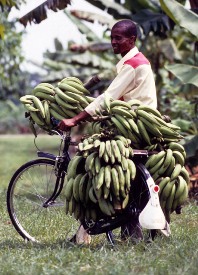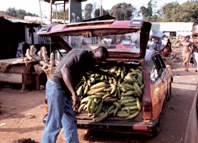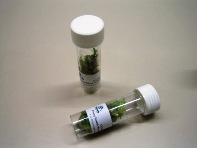Articles
Distribution of banana genetic resources
Contributors to this page: Bioversity International, Belgium (Ines Van den Houwe); Bioversity International, France (Nicolas Roux); IIITA, Nigeria (Dominique Dumet, Badara Gueye); CIRAD, France (Jean-Pierre Horry).
|
|
Banana users (Photo: IITA) |
|
|
Banana users (Photo: IITA) |
An important role of in vitro genebanks is the distribution of germplasm to different users.
Click here to open a PDF document that shows how to disseminate general germplasm in detailed steps.
|
Contents: |
Common policies on distribution and access to plant material
- Follow the International Treaty on Plant Genetic Resources for Food and Agriculture (ITPGRFA) for in-trust germplasm using the Standard Material Transfer Agreement (SMTA).
For germplasm of crops listed in Annex 1 (click here for details), including cultivated Musa that will be used for breeding, research and training for agriculture, the Standard Material Transfer Agreement (SMTA) should be used for all distribution, both from CGIAR genebanks and from Contracting Parties.
1) If the material meets the health status requirements for distribution (i.e. it is virus indexed negative for all viruses). If an accession is not available for distribution because of its health status, the requester will be informed and a suitable alternative accession should be proposed, if available.
2) The removal of samples for distribution should not reduce the stocks to below the accepted level for conservation. If only a limited number of replicates of the accessions is present in storage, the accession should be immediately reproduced and the requester will be informed that the request cannot be immediately or fully met.
An order form should be sent to the requester with the agreed list of accessions and the relevant Material Transfer Agreements (MTAs) should be attached to it. The applicant should be asked to complete the order form and to acknowledge acceptance (signature/shrink-wrap mode) of the terms and conditions of the applicable MTAs. The requester should be asked to indicate the type of plant material and number of samples (if not standard) he/she wishes to receive.
Policy exceptions
- None.
National laws and regulations
It is essential to follow the terms and conditions in the host country agreements:
- Export permits.
- Phytosanitary certificate.
- Certificate of origin.
International laws and regulations
The shipment of plant material should be sent with the Standard Material Transfer Agreement under the International Treaty for Plant Genetic Resources for Food and Agriculture.
Phytosanitary regulations
See the Safe Transfer of Germplasm (STOG) section in this website for seed health movement (this is essential to avoid spread of pests and diseases).
- Phytosanitary certificates are needed for most countries.
- It is the responsibility of the requester to supply the genebank with all plant quarantine documents (plant importation permit/import permit labels) from the importing country required to enable the introduction of the requested germplasm into the importing country.
- For germplasm requests outside the EU (in the case of ITC), shipments of germplasm always need to be accompanied by a phytosanitary certificate (PC).
- Upon receipt of the completed order from, acceptance of the MTAs and (copy of) the necessary import documents, the genebank normally applies to its own country laws for a phytosanitary certificate, including the additional declarations exactly as required by the importing country. Only if the conditions of the phytosanitary certificate are in compliance with the conditions of the plant importation permit of the importing country, the introduction of the material into the importing country will be successful.
- For requests of banana germplasm within the EU (in the case of ITC), a plant passport (PP) delivered by the Agency, is required. In some cases the importing country also requires a certificate of origin (CO), stating the exact (oldest traceable) origin of the germplasm. This document should be generally issued by the genebank hosted country.
- When the plant material is ready for shipping, an inspection of the material to be exported should be arranged with the Agency, in order to ensure that additional requirements of the importing country are fulfilled.
User related issues for distribution
Feedback to users
Factors that can influence the delivery of plant materials:
- Respond to requests with lists of material, forms and conditions of access, SMTA as soon as possible after receipt of request (users may not know about the conditions so it is better to inform them before proceeding with the request).
- Provide passport and germination data with requests.
Recommended procedures that ensure the material distributed matches the client request:
- On specific requests, match accession numbers with specified request.
-
If accession numbers are not specified, match accessions to users' needs. These could include:
- Species.
- Plant habit to fit the crop system.
- Environment.
- Use.
Feedback from users
The most relevant information required to be received from the users is as follows:
- Information on characterization and evaluation/use (information on performance in one area allows better selection of germplasm for similar areas).
Quantity of material recommended to be distributed
It must be sufficient to cover the diversity in the accession and produce material for future use (users should have access to the full diversity within the accession and sufficient plant material to multiply in order to obtain a genetically similar sample for future use. The provision of small quantities maintains the stocks and reduces the multiplication frequency.
In order to meet users requirements, three types of material can be made available:
- Proliferating shoot tip cultures. Usually proliferating tissue cultures are supplied for further propagation or studies in vitro.
- Individual rooted plantlets are supplied if the requester is not able to handle clusters of multiple shoot or bud cultures and they are suitable for immediate soil planting under controlled conditions (nursery).
- Freeze dried leaf tissue suitable for molecular studies (DNA, RNA and protein research).
As a standard, five samples of living tissues (shoot tip cultures or rooted plants) should be provided per accession. For leaf tissue samples usually one packet containing 0.5 g tissue (fresh weight) should be supplied.
The applicant should be requested to give a short description of the intended research use of the requested material.
Availability check
Availability of stock
- Check availability of vegetative material in the field or laboratory.
- Distribution of the requested material should not cause (i) the accession to fall below the minimum stock level or (ii) distribution of vegetative cuttings should not cause plant death.
- Unhealthy accessions or those with little vegetative material should not be distributed.
Checking passport data
- Passport data can be checked to ensure that the species is adapted to the requester’s needs (this avoids waste of germplasm by sending material that the requester does not need or want).
|
Proliferation tissue for shipping |
Preparing vegetative materials for distribution
Proliferating shoot tip cultures
- Propagules of the requested accession should be taken from the stock in MTS and re-propagated in 50 ml plastic culture vessels containing 10 ml proliferation medium and closed with a screw cap.
- The culture vessels should be incubated under normal growth conditions (incubated at 28oC for 14 days at light intensity) for three weeks, before shipping.
Before propagules are transferred to the transport vessels, they should be indexed for bacterial contamination.
- If the importing country requires that the material is free of specific bacterial diseases, the propagules should be tested on a selective medium for the pathogens concerned.
In vitro rooted plantlets
- A few tissue culture samples of the requested accession should be retrieved from MTS and regenerated into unrooted shoots, planted on a regeneration medium with less cytokinins.
- These should be aseptically transferred to Cultu saks®, gas-permeable plastic tissue culture bags which can be heat sealed watertight but allow gas exchange.
- Cultu saks® are easy, economical, light and unbreakable and thus very suitable for transportation of plant tissue.
- The bags must contain a semisolid root-inducing culture medium, containing half strength macronutrients of MS salts, MS vitamins, enriched with 15 gl-1 sucrose and 1 µM of the auxin IBA (indolebutyric acid) to promote root formation.
- The roots usually appear within ten days.
- Plants can be kept viable for several months in these cultu saks awaiting a convenient moment for planting at the recipients facilities.
Lyophilized leaf tissue
The required number of samples of each requested accession should be removed from the lyophilized leaf bank.
- A standard of one sample bag per accession should be provided.
Dispatching of plant material
The plant material should be labelled with the accession ID and name. It should be packed in a cardboard box coated with shock absorbent plastic to avoid damage to the culture containers during transit. Inside the parcel the following documents should be enclosed:
- A shipment notice or cover letter with a copy of the relevant MTAs, signed and dated by the Provider and User.
- A packing list with the details of the parcel’s content (the Provider and name of the accession enclosed, the type of cultures and the number of replicates).
- A health statement with the results of the virus indexing tests undertaken on the shipped accession.
- The accession passport data.
- A receiving report: the recipient is requested to fill out and return a fax report sheet to acknowledge receipt and to inform the provider on the status of the plant material upon arrival.
- An information sheet regarding the handling of in vitro propagules accompanies the shipped germplasm. For proliferating tissue cultures this includes the composition of the culture media to be used for the further propagation of the plants. Where in vitro rooted plants are shipped, post-flask handling instructions for the tissue culture plants are provided.
The consignment should be shipped by Express Mail in order to keep the journey as short as possible and minimize the risk of deterioration of the plant material.
Recording information during distribution
System for tracking material/inventory system for distribution
- Update related data tables in database management system (a database system allows easy and fast access to data and allows macros to be written for routine operations).
- Use labels with good adhesive and clear printing (this avoids errors and mixing of material during shipping).
References and further reading
Tenkouano A, Swennen R. 2004. Progress in breeding and delivering improved plantain and banana to African farmers. Chronica Horticulturae 44(1):9-15.
Van den Houwe I, Jones DR. 1994. Musa germplasm distribution from the INIBAP Transit Center. Meeting: First Global Conference of the International Musa Testing Program, La Lima (HND), 27-30 April 1994. Publisher: INIBAP, Montpellier (France). Available here.
Van den Houwe I, Panis B. 2000. In vitro conservation of banana: medium term storage and prospects for cryopreservation. In: Razdan MK, Cocking E, editors. Conservation of Plant Genetic Resources in vitro. Vol. 2. M/S Science Publishers, USA. pp. 225-257.
Comments
- No comments found







Leave your comments
Post comment as a guest